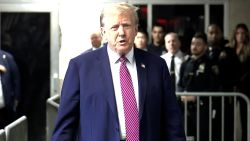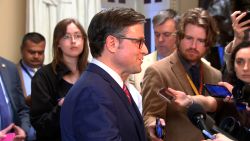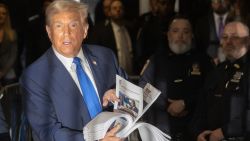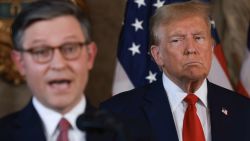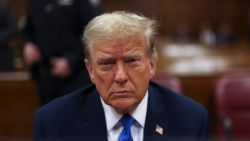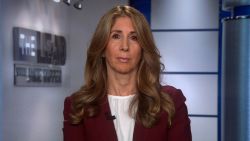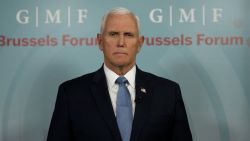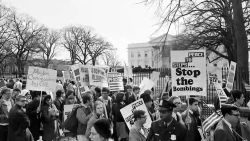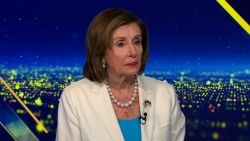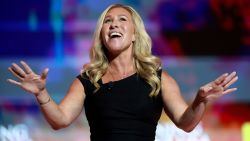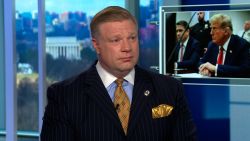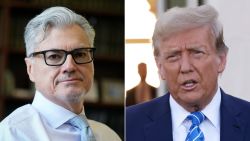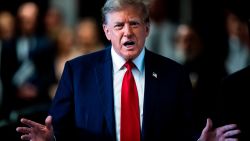President Donald Trump often gripes about his bad press – but as his state visit to Japan shows, sometimes he’s his own worst enemy.
Trump ought to be in the middle of an easy two-week cruise of flattering coverage and statesman-like imagery, with British royals set to follow Japan’s imperial court and roll out the red carpet pageantry that he loves next week.
He could have stepped away from the perpetually raging Washington storm, especially since Congress is on a recess that could offer a timeout from his separation-of-powers showdown with Democrats.
But asking Trump to avoid controversy is like expecting a moth to avoid a light bulb. So the President made a conscious choice to use his brief trip to Asia to whip up new outrage back home over the 2020 election and his handling of North Korea.
He sided with the official media of vicious dictator Kim Jong Un in an attack on his potential 2020 rival Joe Biden and by extension on the US democratic process. He could easily have sidestepped the issue – but consistent with his norm-shattering political method, he chose to escalate it.
Then, desperate to preserve the credibility of his failing diplomatic opening with Kim, Trump shrugged off short-range ballistic missile tests by Pyongyang that threaten the Japanese hosts who gave him a staggeringly warm welcome.
Approval rating obsession
The President last week had lashed out at the media, complaining that without its “fake news” and the Mueller investigation, his approval rating would be at 75%.
Yet he spent the weekend piling up unflattering headlines that help to explain why his rating is closer to 40% than the majority of public opinion that ought to ensure a first-term president presiding over a good economy four more years in the Oval Office.
And it’s a good bet that the President won’t be able to resist injecting himself into Britain’s political torment over Europe when he’s in London next week as a guest of the Queen.
He’s got a history of injecting himself into the Brexit debate, and will arrive in London with Prime Minister Theresa May heading for the exit of 10 Downing Street and the governing Conservative Party searching for a new leader.
It’s as if the publicity-hound President can’t bear the thought that he might be out of sight, out of mind, for Americans when he is thousands of miles away. In a Sunday tweet, he pointed out that he was still plugged in even though it was “very early in the morning in Japan,” as he watched the Indy 500 auto race. CNN reported last week that the President gets angry if his favorite Fox News is not available in foreign hotels.
One of the unique characteristics of the Trump administration is the President’s almost limitless energy to wage concurrent political fights at any hour of day or night.
While in Japan, the indefatigable Trump weighed in, mostly on Twitter, on post-election Israeli politics, slammed Democrats for getting “NOTHING” done, demanded a change in libel laws and called for a prolongation of the annual Rolling Thunder Vietnam veterans event in Washington, which is expected to wrap up this year.
He demanded an apology from the press for the “Russian collusion delusion,” gave shout-outs to his favorite conservative pundits and promoted Fox News shows.
Trump might have been 13 time zones to the east, but he was burning up everyone’s social media timelines and cable television, and demanding as much attention as ever. It was as if he were holed up in the White House or at one of his golf resorts like he is every other weekend.
Such ubiquity is vital for a President who has bet his second term squarely on an impassioned turnout from his political base, which he seeks to keep in a constant state of anger.
Yet another norm shattered
Even for Trump, who took Russian President Vladimir Putin’s denials of election interference at face value at a notorious Helsinki news conference, his willingness to embrace Pyongyang’s assessment of the Democratic front-runner was daring.
“Kim Jong Un made a statement that Joe Biden is a low-IQ individual. He probably is, based on his record,” Trump said alongside Japanese Prime Minister Shinzo Abe.
The comment did not just infringe conventions that once precluded American presidents from waging domestic politics overseas – which Trump has long since dumped after they were eroded by his recent predecessors.
But by aligning himself with a murderous tyrant who leads a hostile power against a political rival, the President also seemed to be inviting other foreign leaders to do what they can to help his re-election, whatever the consequences for American democracy.
The President also refused to accept the assessment of his own national security adviser, John Bolton, that North Korea’s recent ballistic missile launches infringed UN Security Council resolutions.
“My people think it could have been a violation, as you know. I view it differently,” Trump said, referring to the tests, which even his own top aides believed infringed UN resolutions.
The most charitable interpretation of the President’s comment is that he was trying to keep open his dialogue channel with Kim and to avoid reacting to provocations that could put the US and North Korea back on a dangerous path to confrontation – an outcome no sane person wants.
But Trump’s critics suggested his motives were more personal.
“President Trump regards North Korea, of course, as his signature issue He’s not going to admit that the fundamental cause of this problem with North Korea is their nuclear weapons,” said Joseph Yun, who served as US special representative on policy toward the isolated state in the Barack Obama and Trump administrations.
“He’s not going to admit that there has been no progress towards getting rid of North Korean weapons. We must remember the electoral cycle is now with us in the United States,” Yun told CNN’s Brooke Baldwin.
And the President’s construction of a more convenient personal reality on North Korea begs another question.
“At this point, what else is President Trump going to let Kim Jong Un get away with?” Samantha Vinograd, who was a senior national security aide in the Obama administration, said on CNN.
It was an odd way to pay back Japan for its lavish hospitality, which saw Trump become the first foreign leader to meet the new Emperor, Naruhito, and attend a sumo wrestling tournament with Abe.
The President’s comments also opened new divisions between Bolton and him, which raised fresh questions about the national security adviser’s position and the true nature of US foreign policy with several crises, including with Iran, escalating.
North Korea was quick to try to widen the rift with a vitriolic dispatch from its official news agency, KCNA, branding Bolton a “war maniac” with a “different mental structure from ordinary people.”



